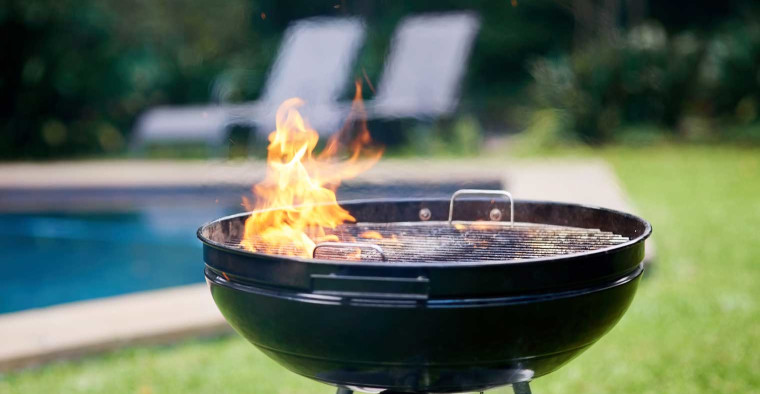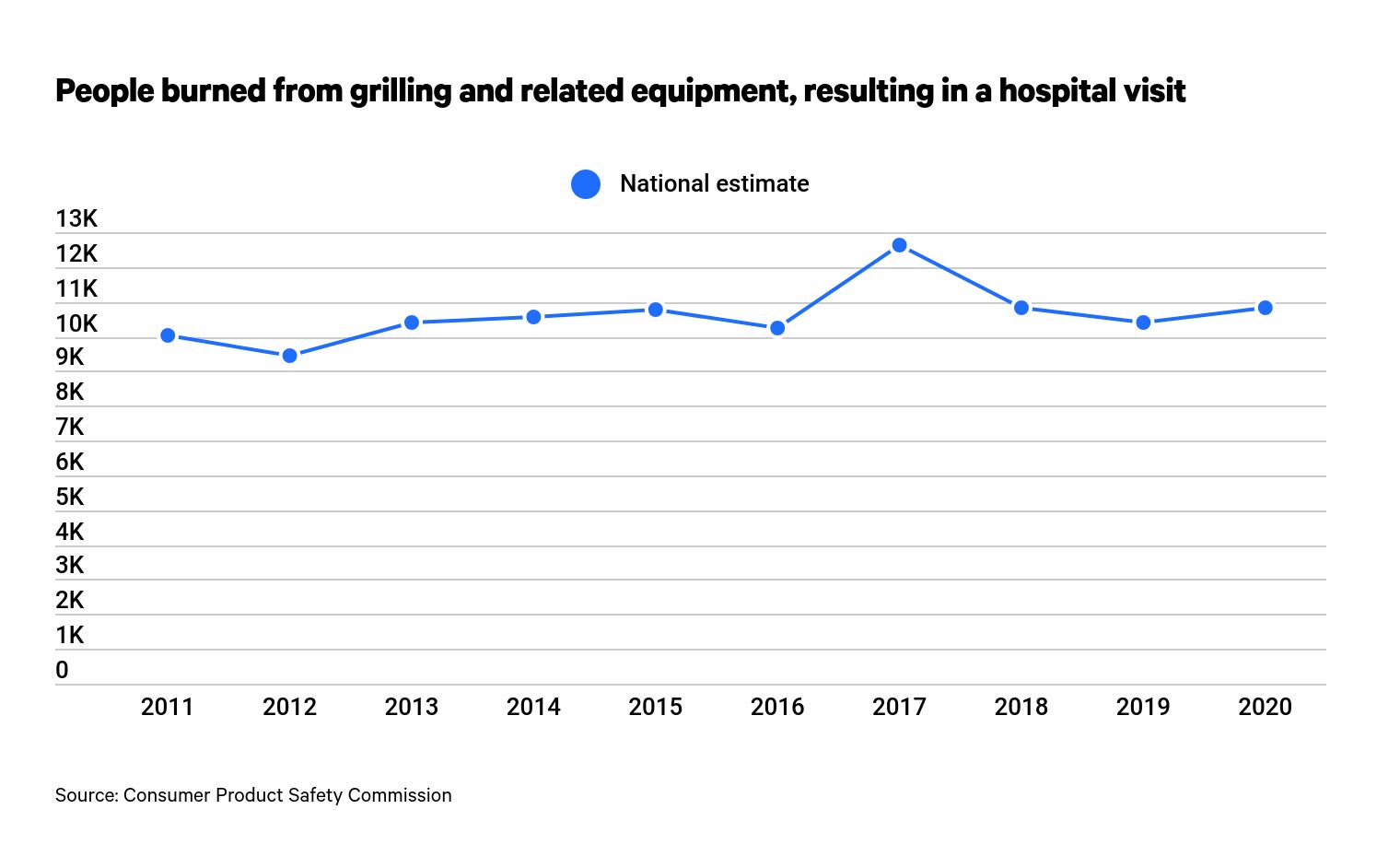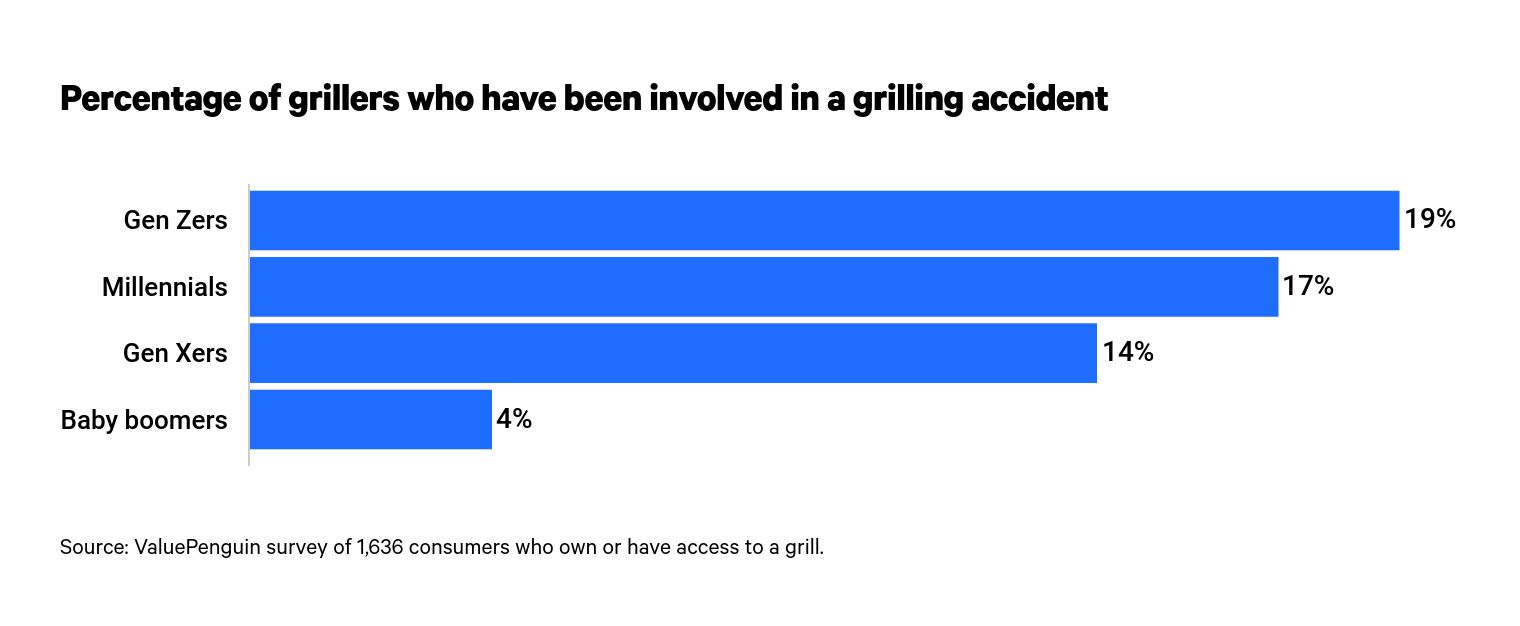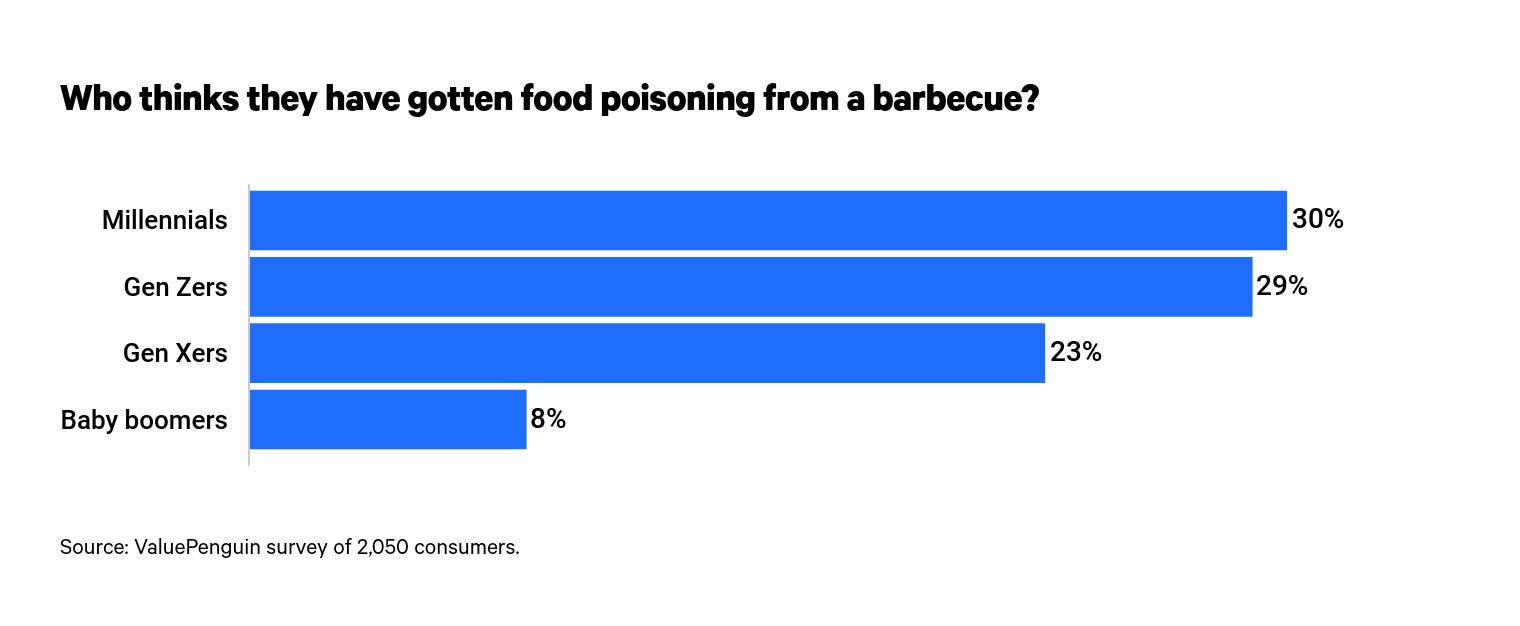Homeowners Insurance
Nearly 40% of Grillers Admit to Barbecuing Drunk — And They’re 4 Times More Likely to Get Hurt

As the number of vaccinated Americans increases and the weather warms, enthusiasm for traditional summer parties grows. This summer, 7 in 10 Americans plan to attend or host a cookout. But the more than 10,000 grilling-related injuries reported every year, on average, underscore the importance of grill safety.
Thirteen percent of those who own or have access to a grill report having suffered a grilling-related injury, with nearly 1 in 5 Gen Z grillers being injured in the past. Additionally, data shows that alcohol can increase the likelihood of being injured at the grill. In fact, a drunken griller is four times more likely to be injured than a sober counterpart. Given the prevalence of alcohol at summer barbecues, it becomes more important to be vigilant of potential grilling-related accidents.
At the same time, accidents at barbecues don't come in one form. To this end, 22% of Americans believe they have contracted food poisoning at a cookout. One possible explanation for this is that 67% of grillers say they don't use a thermometer to check whether their meat is fully cooked. And nearly half don't clean their grills after each use — including fewer who have access to a community grill.
Key findings
- It’s the summer of barbecues as more Americans are vaccinated against COVID-19. 71% of Americans plan to attend or host a summer barbecue — making grill safety even more important.
- Grilling while drunk is fairly common, but those who do so are more likely to get hurt. 37% of grillers say they have fired up the barbecue while drunk, and those who have are four times as likely to have been in a grilling-related accident (25% of drunken grillers, compared with 6% who only grill sober).
-
Food safety hazards abound at barbecues. 2 in 3 grillers don’t use a meat thermometer to confirm their meat is fully cooked, which could be one reason 22% of Americans believe they’ve contracted food poisoning at a barbecue.
- Some grillers aren’t keeping theirs clean — especially those who share it with others. 47% of grillers admit they don’t clean the grill after every use, which is recommended. That jumps to 59% among those who use a shared community grill, compared with 44% who have their own.
- Many grill owners aren’t sure how that impacts their insurance. Only 34% know that grilling-related damages are covered under their home or renters insurance policy.
While 13% of grillers have been involved in a grilling-related accident, injuries are more prevalent among those who grill while drunk
Four in five Americans either own a grill or use a community grill. With this sort of prevalence, it's natural that grilling injuries commonly occur. The Consumer Product Safety Commission reports that an average of 10,600 people a year are burned by barbecue grills and related equipment that require a hospital trip. In fact, ValuePenguin found that the number of accidents in which grills play a part could affect people more frequently.

Thirteen percent of Americans who own or have access to a grill have reportedly experienced a grilling-related accident. Gen Zers (ages 18 to 24) are the most likely to have had a grilling-related accident, at 19%. By comparison, baby boomers are the safest grillers, as just 4% have experienced a similar accident.
Men are 55% more likely than women to have experienced a grilling-related accident.

The chances of experiencing a grilling-related injury increase significantly when alcohol is involved. Despite the risks, it's fairly common for people to grill while intoxicated. Thirty-seven percent of grillers say they’ve captained a grill while drunk, with 9% admitting they're drunk most times when grilling.
Drunken grillers, though, are four times more likely to be involved in an accident than sober cooks. One-quarter of drunken grillers have had a grilling-related accident, compared with 6% of those who barbecue sober. This may affect middle-aged Americans most heavily. According to ValuePenguin’s findings, millennial (age 25 to 40) and Gen Xer (age 41 to 55) grillers are the most likely to grill while drunk.
Barbecues may be responsible for cases of food poisoning affecting 22% of Americans, and unsafe cooking practices may be to blame
This summer, 71% of people plan to attend or host a barbecue. Of these, 22% plan to host and attend at least one cookout. With such a large number of people attending barbecues this year, it's more important to be on the lookout for unhealthy food preparation.
Twenty-two percent of Americans believe they contracted food poisoning from a cookout in the past. Nearly one in three millennials and 29% of Gen Zers recall getting sick from a barbecue — the most affected age groups.

One reason why food poisoning may occur at a cookout is due to insufficiently cooked meat. Indeed, two in three grillers don’t use a meat thermometer to verify that their meat is safe to eat — and, more importantly for parties, serve. As an alternative, four in 10 grillers prefer to cut the meat open to see how it looks. This may be fine for steaks, but cutting open bone-in pork or chicken may produce mixed results as the meat takes longer to cook the closer to the bone it is.
Another reason cookout attendees could be beset with food poisoning is because of the sparse cleanings many people give their grills. Seventeen percent of grillers only clean their grill's surface after four or more uses. Cleaning one's grill with a bristled scrubber helps dislodge old food particles, which might otherwise spoil after too long, from the cooking surface.
66% aren't sure how their home or renters insurance treats grilling-related damages
When it comes to grilling and home insurance, 39% of grill owners — the largest group, in this case — aren't sure whether they would be covered for grilling-related accidents. Baby boomer (ages 56 to 75) grill owners are the least likely to know how their insurance treats grilling, with 55% unsure. Following this demographic is Gen Xers, 39% of whom aren't sure whether their insurance policies would cover a grilling accident.
Fortunately for insured grillers, standard home and renters insurance policies provide coverage against fire damages.
There are a few potential complications that could come into play if a griller experiences an accident. Home insurance coverage doesn't apply if the damage stems from an improperly maintained or serviced grill. If a propane leak causes a fire, and it's due to a faulty fuel line that a griller knew about but neglected to fix, they would have difficulty getting reimbursement for damages. Similarly, if a breakdown results from mechanical failure or wear and tear, most insurers won't cover those damages.
It's not uncommon for home insurance providers to offer only partial coverage for expensive items. An insurer may only cover a grill for a set amount, hundreds of dollars beneath its value. If a grill is particularly expensive or intricate, its owner may have to get expanded or increased property coverage — typically in the form of a home insurance floater — to get full protection.
Finally, it's possible for a homeowner to be the target of a lawsuit if a guest at a barbeque they were hosting was injured and they decided to press charges. The liability portion of the host's homeowners insurance would provide financial protection by covering the costs of a lawsuit — even if the host were to lose the judgment. Liability claims do raise the cost of homeowners insurance, but the cost of such a price increase is offset by the savings the homeowner gains from their liability protection by not having to pay legal fees. Homeowners may purchase additional liability coverage in the form of an umbrella policy in order to make sure they'd be fully protected against a costly lawsuit.
Methodology
ValuePenguin commissioned Qualtrics to conduct an online survey of 2,050 U.S. consumers from May 3-6, 2021. The survey was administered using a non-probability-based sample, and quotas were used to ensure the sample base represented the overall population. All responses were reviewed by researchers for quality control.
We defined generations as the following ages in 2021:
- Generation Z: 18 to 24
- Millennial: 25 to 40
- Generation X: 41 to 55
- Baby boomer: 56 to 75
While the survey also included consumers from the silent generation (defined as those 76 and older), the sample size was too small to include findings related to that group in the generational breakdowns.
